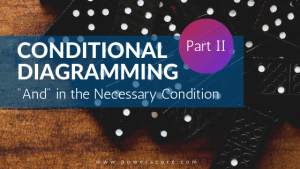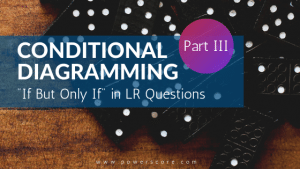Flaw in the Reasoning questions require you to identify the underlying logical flaw in the argument. Over time, Flaw questions have become among the most common question types on the Logical Reasoning section of the LSAT. In fact, they account for approximately 15% of all questions and 30% of all First Family questions. Your next test will likely contain as many Flaw questions as all Main Point, Method, Parallel, Parallel Flaw, and Cannot Be True … [Read more...]
Approaching Logic Games Sections Strategically
Approaching the LSAT Strategically Series: Part I, Part II, Part III There is a fundamental truth about test takers when it comes to the LSAT: everyone is different. That is, everyone who sits down with this exam will have unique strengths and weaknesses, likes and dislikes, and ultimately, ways they can optimize their performance in every section. While that certainly affects how it is that people prepare, I think it also dictates how test … [Read more...]
Conditional Diagramming Part II: “And” in the Necessary Condition
In my last post, I discussed conditional statements with "or" in the sufficient condition. Diagrams with multiple necessary conditions can, depending on the circumstances, then be used to create multiple single diagrams. Let's look at an example.If the rule reads: "If Operations is offered, then Accounting or Sales is also offered," then the diagram is solely: A O → or S Because the necessary condition is just at least … [Read more...]
The Best Places to Take Practice LSATs
There's less than a week to go before the LSAT, and students, I imagine yourself included, are in full-on practice test mode. This is a good thing: you need to get acclimated, and timed practice tests are the way to do it. With that in mind, many wonder where they can best replicate the test day experience. Let's explore some options.Let me start by saying that nothing exemplifies test day like test day, so we're really only aiming at … [Read more...]
Conditional Diagramming Part I: “Or” in the Sufficient Condition
Diagrams with multiple sufficient conditions can, depending on the circumstances, then be used to create multiple single diagrams. Let's look at an example.Consider a rule that reads: "If Operations or Sales is offered, then Accounting is also offered." Operations = O Sales = S Accounting = A As a single conditional statement, there are two parts to the sufficient condition (O and S), that are joined by an "or" operator. That sufficient … [Read more...]
Conditional Diagramming Part III: “If But Only If” in LR Questions
An interesting topic came up on our forum a short time back, about the meaning of “If but only if,” and the proper way to diagram a rule that includes this phrase. Students who are familiar with the LSAT have probably encountered a rule that says “if and only if,” but the use of the term “but” is a clever trick by the test makers. “If but only if” doesn’t look quite the same as “If and only if,” and to many students, the two phrases appear to … [Read more...]
Why Skimming Isn’t Advised on the Reading Comprehension Section
Should You Skim the Reading Comp Passage? In theory, it might seem that skimming could add some degree of efficiency. Unfortunately, in practice, this is not the case. In fact, this approach actually reflects a fundamental misunderstanding of the nature of the Reading Comprehension section.Skimming might be sufficient to absorb lighter materials aimed for simplicity, such as newspapers or magazines. A newspaper editor wants readers to know … [Read more...]
Straw Man Arguments: Logical Reasoning Flaws
Of all the logical flaws you might encounter on test day, a "straw man" argument not only has the most interesting name (and "straw man" is actually the proper name used in logic for this flaw), it also provides some of the most entertaining examples. In the context of an LSAT question, however, the usage is fairly predictable.Typically, you'll see a stimulus with two speakers. The second speaker will reframe the first speaker's argument in a … [Read more...]
How to Avoid the 2 Most Common Mistakes in LSAT Conditional Reasoning
A student of ours who's working through the PowerScore Logical Reasoning Bible asked a common question the other day, and I want to share it, and my response, with you. Specifically she's been struggling with Mistaken Negations and Mistaken Reversals in conditional reasoning, and asked if I could help her better understand those two errors. Here's my reply: Common Roadblock Conditional reasoning is a tricky concept for a lot of people, so don’t … [Read more...]
What Questions Matter the Most in Logical Reasoning?
In every LSAT class I teach, sooner or later the same inquiry pops up: "What’s the most important type of question in Logical Reasoning?" Students asking this question often remind me of an ER nurse, triaging patients based on the seriousness of their condition. Hopefully, you won’t find yourself in this predicament, having to triage your study of Logical Reasoning. But if you must, here’s some advice:While it is difficult to say which … [Read more...]
Studies in LSAT Perfection: Alinea
A few years ago I read an inspiring book called Life on the Line by Grant Achatz. Grant is the head chef at Chicago’s Alinea restaurant, which has repeatedly been named one of the best restaurants in the world. He rose through the chef ranks to head up his own kitchen, only to then battle tongue cancer that nearly took away his sense of taste permanently (he’s ok now, fortunately). I liked the book so much that I made a trip up to Alinea last … [Read more...]
Avoid These Common LSAT Practice Test Mistakes
Most students know that practice tests are important, but several common mistakes are made in the approach to this vital component. If you are willing to invest the time and effort it takes to complete full tests, you need to get the most out of the entire process.Take Full Tests Some students solely study LSAT concepts and avoid practice tests, but the LSAT is not merely a test of concepts. Even if you are completely comfortable with … [Read more...]
Studies in LSAT Perfection: Oregon’s Blur Offense
For a while now, I’ve been meaning to write a series of articles on how the pursuit of perfection in various fields can teach valuable lessons for LSAT preparation, and how that pursuit sometimes conflicts with prevailing conventional wisdom. In honor of tonight’s national championship football game, we start with Oregon’s Blur Offense. The Blur Offense If you’re not familiar with football or are just a casual fan, you may not be aware that … [Read more...]
LSAT Progress: Learning from Your Mistakes
People who decide to go to law school, and thus prepare to take the LSAT, tend to have some personality traits in common. They tend to be driven, confident, and prone to blowing any perceived failure completely out of proportion. I'm not putting anyone down. In fact, it should be fairly obvious given my profession that I'm talking as much about myself as anyone else. But, if in addition to myself, I've also described you, consider this: you're … [Read more...]














